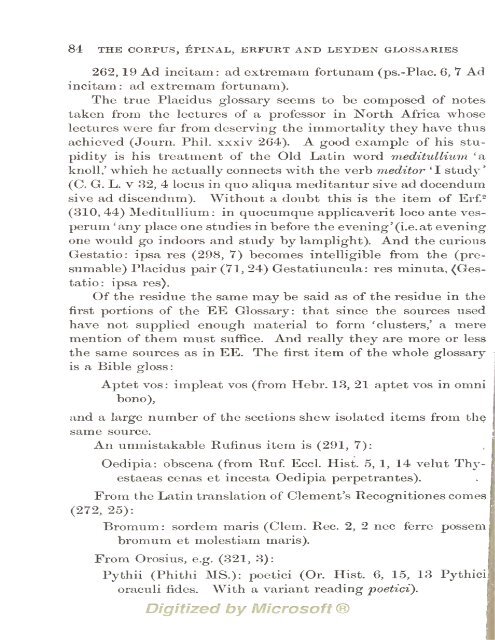the corpus, épinal, erfurt and leyden glossaries, viii - World eBook ...
the corpus, épinal, erfurt and leyden glossaries, viii - World eBook ...
the corpus, épinal, erfurt and leyden glossaries, viii - World eBook ...
You also want an ePaper? Increase the reach of your titles
YUMPU automatically turns print PDFs into web optimized ePapers that Google loves.
84 THE CORPUS, EPINAL, EEFURT AND LEYDEN GLOSSARIES<br />
262, 19 Ad incitam: ad extremam fortunam (ps.-Plac. 6, 7 Ad<br />
incitam: ad extremam fortunam).<br />
The true Placidus glossary seems to be composed of notes<br />
taken from <strong>the</strong> lectures of a professor in North Africa whose<br />
lectures were far from deserving <strong>the</strong> immortality <strong>the</strong>y have thus<br />
achieved (Journ. Phil, xxxiv 264). A good example of his stu-<br />
pidity<br />
is his treatment of <strong>the</strong> Old Latin word meditulliiim 'a<br />
knoll,' which he actually connects with <strong>the</strong> verb meditor 'I study'<br />
(C G. L. V 32, 4 locus in quo aliqua meditantur sive ad docendum<br />
sive ad discendum). Without a doubt this is <strong>the</strong> item of Erf^<br />
(310, 44) Meditullium: in quocumque applicaverit<br />
loco ante ves-<br />
perum 'any place one studies in before <strong>the</strong> evening '(i.e. at evening<br />
one would go indoors <strong>and</strong> study by lamplight). And <strong>the</strong> curious<br />
Gestatio: ipsa res (298, 7) becomes intelligible from <strong>the</strong> (pre-<br />
sumable) Placidus pair (71, 24) Gestatiuncula : res minuta, (Ges-<br />
tatio: ipsa res).<br />
Of <strong>the</strong> residue <strong>the</strong> same may be said as of <strong>the</strong> residue in <strong>the</strong><br />
first portions of <strong>the</strong> EE Glossary: that since <strong>the</strong> sources used<br />
have not supplied enough material to form 'clusters,' a mere<br />
mention of <strong>the</strong>m must suffice. And really <strong>the</strong>y are more or less<br />
<strong>the</strong> same sources as in EE. The first item of <strong>the</strong> whole glossary<br />
is a Bible gloss:<br />
Aptet vos: impleat vos (from Hebr. 13, 21 aptet vos in omni<br />
bono),<br />
<strong>and</strong> a large number of <strong>the</strong> sections shew isolated items from th^<br />
same source.<br />
An unmistakable Rufinus item is (291, 7):<br />
Oedipia: obscena (from Ruf Eccl. Hist. 5, 1, 14 velut Thyestaeas<br />
cenas et incesta Oedipia perpetrantes).<br />
From <strong>the</strong> Latin translation of Clement's Recognitiones comes<br />
(272, 25):<br />
Broraum: sordem maris (Clem. Rec. 2, 2 nee ferre possem<br />
bromum et molestiam maris).<br />
From Orosius, e.g. (321, 3):<br />
Pythii (Phithi MS.): poetici (Or. Hist. 6, 15, 13 Pythici<br />
oraculi fides. With a variant reading poetici).

















